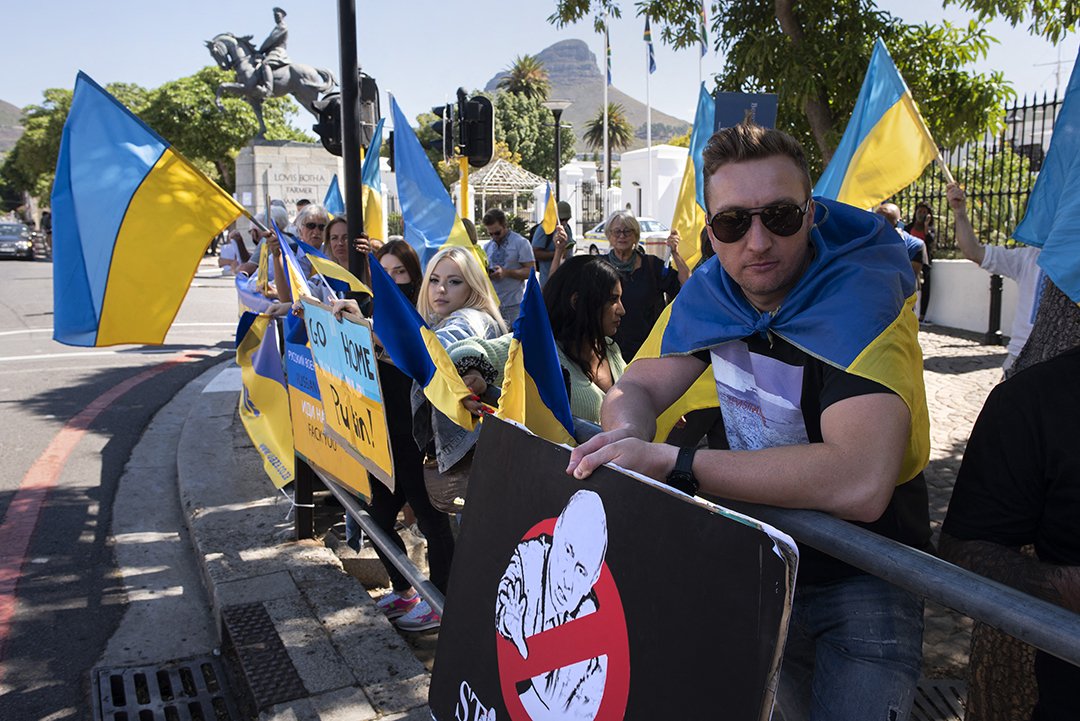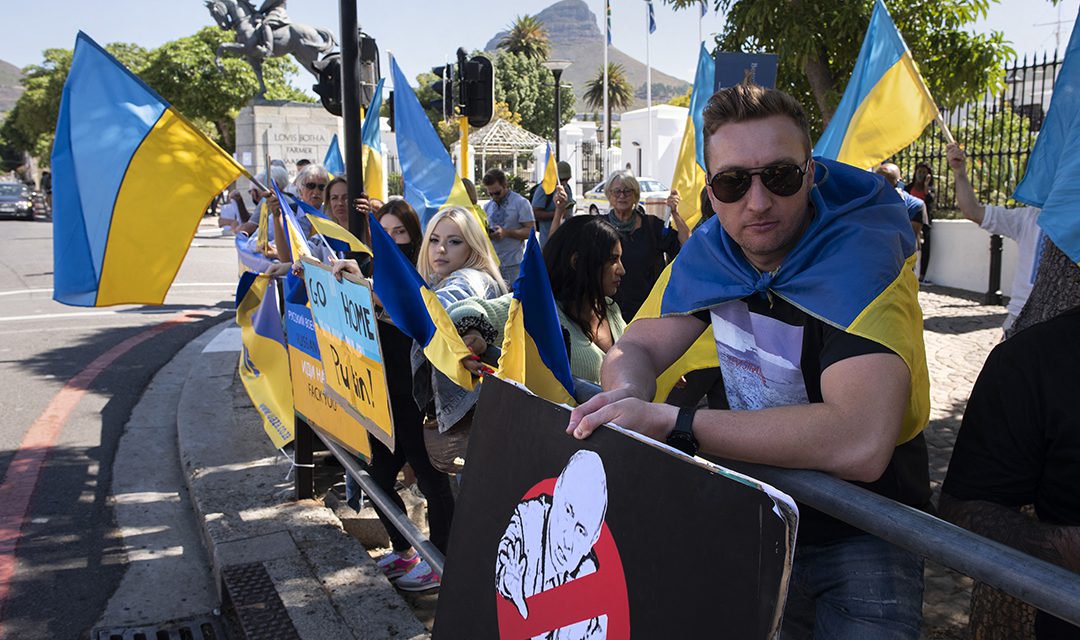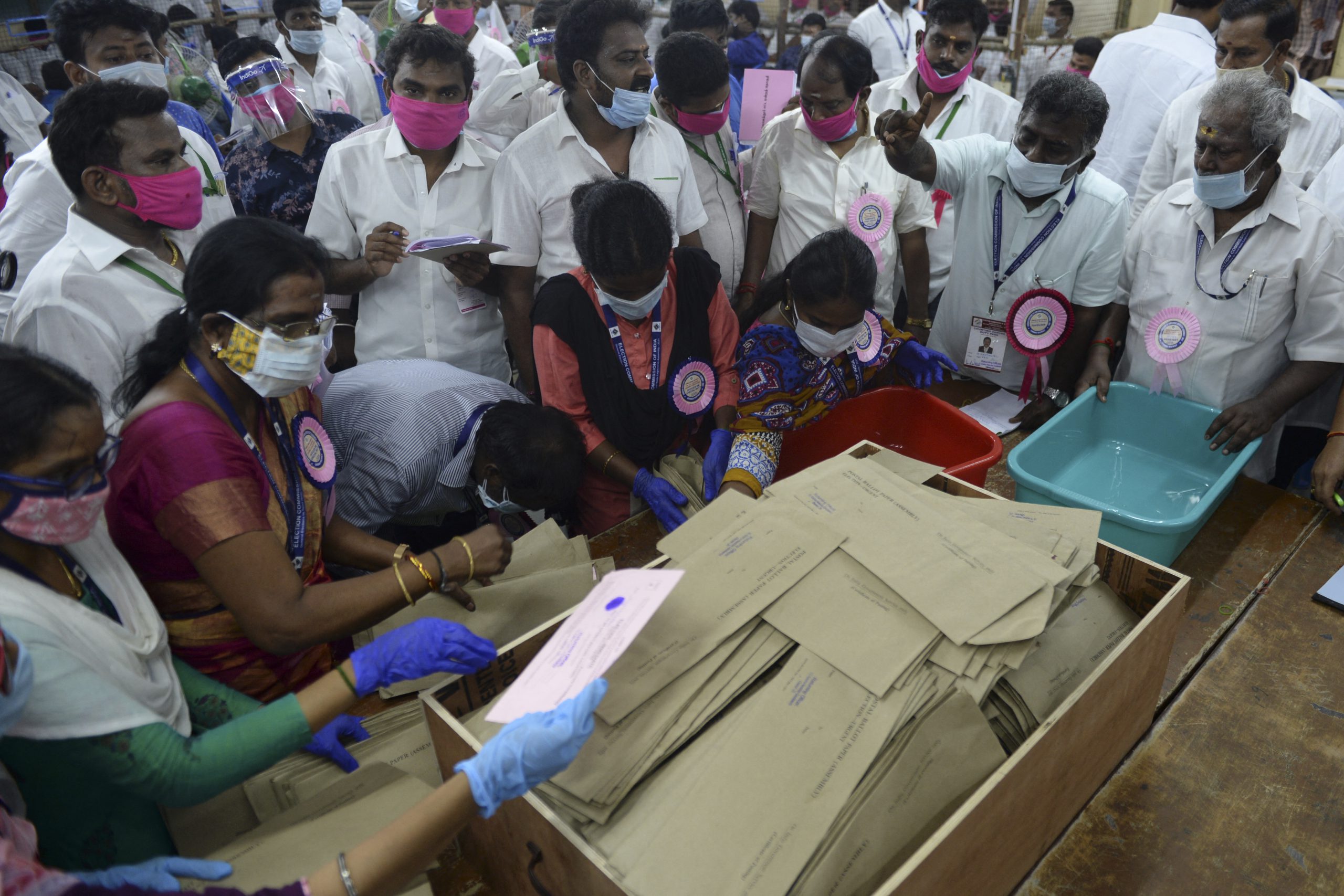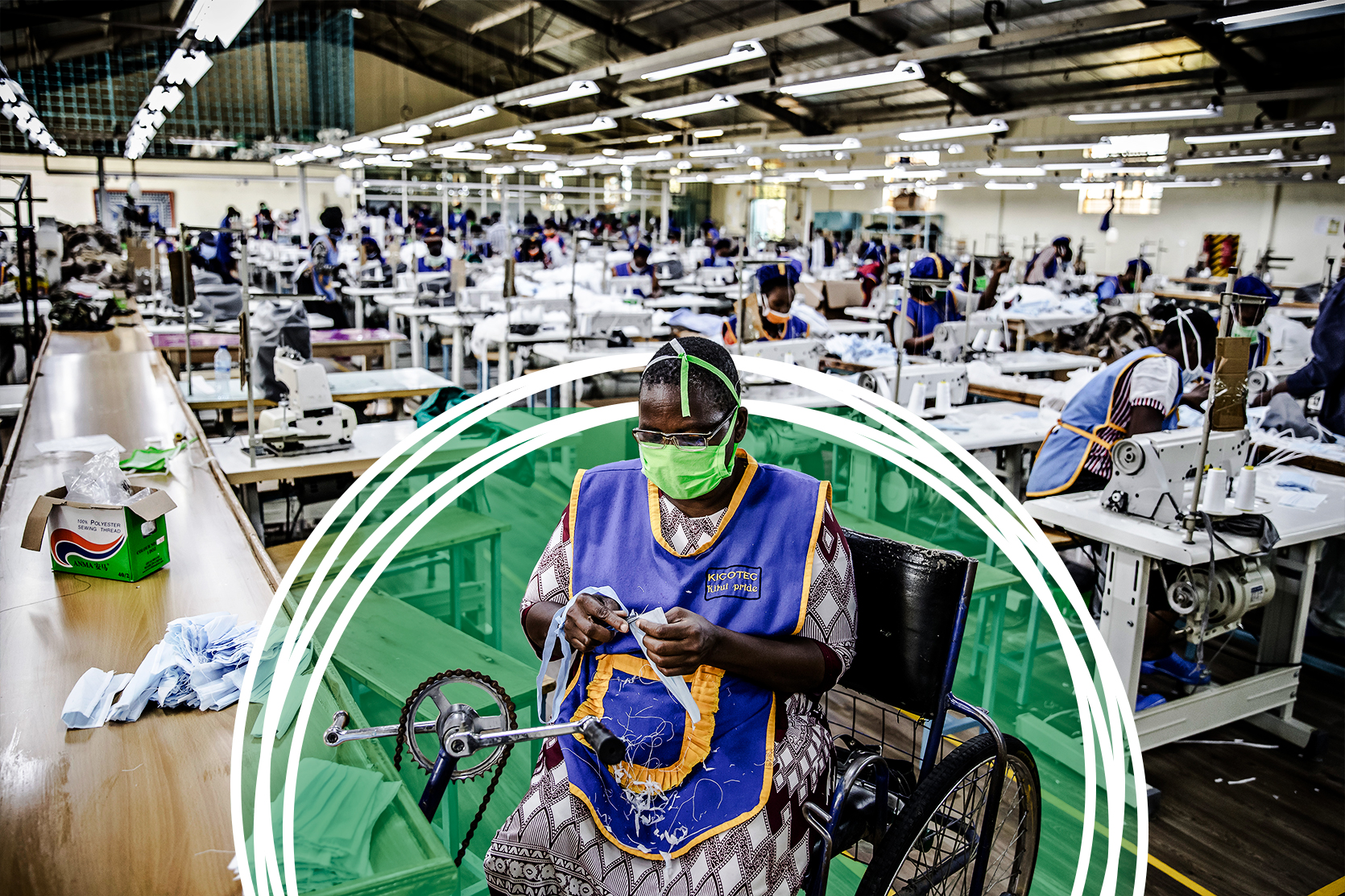Misalignment in South Africa’s foreign policy strategy has been the subject of much recent scrutiny and criticism. Could the issues involved be due to ambiguities in South African foreign policies or are they due to misunderstanding? This article focuses specifically on South Africa’s foreign policy decisions taken in relation to Russia’s invasion of Ukraine – and the resultant protracted conflict – and the insurgency in northern Mozambique.

Protestors stand outside the South African Parliament as a show of support for the Ukrainian people, protesting against Russia’s invasion into Ukraine, and calling for the South African government to condemn the action of the Russians, in Cape Town on March 15, 2022. Photo: Rodger Bosch /AFP
In 1993, in an article published in Foreign Affairs magazine, Nelson Mandela asserted that South Africa’s first democratic foreign policy would be guided by a commitment to human rights, promoting democracy, justice, peaceful resolution to conflicts, and economic cooperation as core principles. This new foreign policy position was an about-turn from the apartheid regime’s foreign policy focus. This new posture was informed by the Constitution, and since then by the White Paper on South African Foreign Policy (2011) as well as precedents set by foreign policy decisions over the years.
During the 1990s and early 2000s, South Africa was a newly democratic country with a material and moral base of influence, gained from its successful negotiation of a peaceful end to apartheid and the transfer of power to a majority-elected government. It used this base of influence as a diplomatic tool when engaging with its Southern African Development Community (SADC) regional neighbours and continental peers in the African Union (AU). That base of influence also enabled South Africa to ‘punch above its weight’ when engaging on global matters in multilateral forums.
Yet, critical discussions on South Africa’s foreign policy positions have grown over the last decade, with many questioning whether the country has developed them clearly and coherently. Recent positions in the international arena have been controversial. Critics have argued that they demonstrate contradictions between the country’s stated foreign policy principles and its values and interests in practice.
The universally accepted norm is that a country’s national interests and values determine its foreign policy. This refers to calculating a nation’s key goals, which could be its economic, ideological, political, and or security interests. However, the values articulated by incumbent governments change over time, often in response to real-world developments. For instance, on 12 May 2022, Dr Naledi Pandor, the Minister of International Relations and Cooperation, delivered the Budget Vote for her ministry in parliament, and re-articulated South Africa’s current position. She placed this in a global context which she characterised as involving “complex shifts in global relations and unprecedented global instability”. Factors cited were the impact of the COVID-19 pandemic, the Ukraine conflict, and questions of social stability in Eswatini, Lesotho, and Mozambique.
South Africa’s history of apartheid and its successful transition to democracy has profoundly shaped an approach to foreign policy that emphasises normative ideals, and in the past, these have given the country a unique position as a moral voice of reason in the international context. This distinctive position has been more influential than its military instruments, as seen through its contribution to conflict resolution globally and the promotion of multilateralism. However, as indicated above, critics argue that there are signs that South Africa’s position as an advocate of peace and human rights is waning.
On the international front, South Africa’s stance, adopted in the March 2022 United Nations General Assembly (UNGA) resolution “Aggression Against Ukraine” is a subject of frustration and confusion, given the mixed messaging that preceded it. For example, at his confirmation hearing before the Senate Foreign Relations Committee as the United States Ambassador-Designate to South Africa, Reuben Brigety said that South Africa’s decision to abstain from supporting the resolution had been “quite disappointing” and “unfortunate”. He called for a return to diplomacy based on “ubuntu”. At home, criticisms were leveled at the governing party’s reliance and continued solidarity with its former Cold War allies, as well as the ANC’s analysis of the changing balance of forces globally in its 2022 National Policy Conference report.
In response to some of the criticism, South Africa appeared to have backtracked on its initial position, or rather that expressed by the Foreign Minister. Subsequently, the position stated that Russia’s actions in Ukraine have “violated international law”. However, the country stated that it remained steadfast in calling for a negotiated end to the conflict, a position based on the view that “in the end, negotiations will end the conflict”. Following the criticisms, South Africa has continued to call for “consistency in the approach of the international community to countries that violate international law”, citing unequal responses to the case of Israel’s continued occupation of Palestine. The government appeals to the observation that most Western powers fail to give the same prominence and attention to this as they have to Russia’s violations.
When Russia invaded Ukraine almost four months ago, South Africa’s proposal of a negotiated settlement was critically derided by several Western leaders. As the conflict drags on, some Western leaders have nonetheless appeared to soften their stance; calls for an immediate withdrawal of Russian troops have become calls for peace talks with Moscow. President Volodymyr Zelensky recently stated: “Negotiation is [the] only way out of war”, though Zelensky has made it clear that he will not surrender Ukrainian territory.
Some may still argue that South Africa’s position undermines its ability to act as a credible normative broker in the global arena. However, history may judge it differently. South Africa’s history in achieving a negotiated peace settlement may still give the country moral standing. Minister Pandor stated: “The international community must focus on finding a sustainable solution. It will not be found in isolating one party or bringing it to its knees. We do not want to go down the route following the Treaty of Versailles.” The merits of such an argument should be rigorously debated. Abstention – regardless of appearance – is technically not disagreement or necessarily anti-Nato per se. Nonetheless, whether abstention on such an issue provides a seat at the negotiating table or not must be part of the debate.
At the regional level, South Africa may also have been expected to take a more prominent role in the growing insurgency currently playing out in northern Mozambique. South Africa has been criticised for not being as proactive and aggressive as Rwanda in getting involved to address rising insecurity in the neighbouring country. However, the Rwandan deployment is a bilateral agreement, which means deployment is more rapid. South Africa’s room for manoeuvre is limited, given that it is guided by the more bureaucratic multilateral SADC response.
Respect for sovereignty is a key SADC principle. Without it, the regional organisation would falter, fail to effectively carry out its mandate, and possibly cease to exist. South Africa’s perceived slowness to deploy troops to the SADC force in Mozambique can be attributed to Mozambique’s reluctance to allow a SADC force to be deployed in the country. As soon as Mozambique had accepted and approved the deployment of a SADC force, in July 2021 South Africa was quick to deploy 1,495 SANDF members to the SADC force. This deployment was extended in April 2022 at the cost of R2.8 billion. Part of what makes the issue complex is that those who respect the pre-eminence of sovereignty are confused that South Africa did not, on that principle, vote in favour of the UN motions. As indicated above, there are also other factors to consider.
In short, as envisioned by the Constitution, South Africa’s foreign policy should continue to adopt a principled stance, advocating for principled solutions to complex international relations issues while calling for more accountable global governance. The South African government will be best served through better articulation of its foreign policy decisions in a clear, transparent, and coherent manner to mitigate against a trust deficit and misunderstandings developing at the expense of the country’s interests, international relations commitments and status.
[activecampaign form=1]











